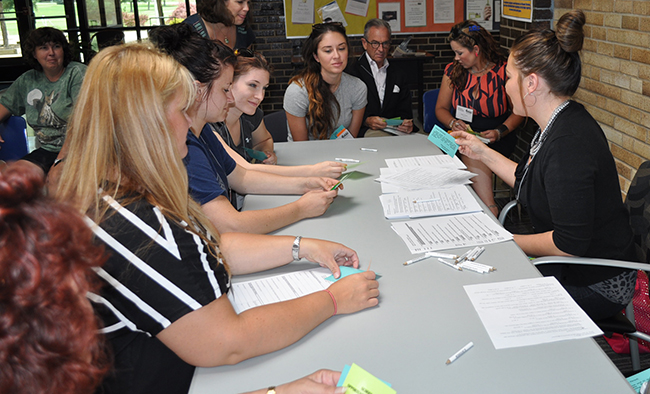Poverty simulation teaches students about hardships
Kent State Salem’s nursing students and faculty took part in a poverty simulation exercise Aug. 15 designed to shed light on the hardships ofthose who struggle to survive month-to-month.
Sondra O’Donnell, administrative assistant in the Department of Nursing and of the Community Action Agency of Columbiana County, organized the event to help participants comprehend the struggles of living in a low-income family.
“We thought that it would be important for students and faculty to be aware of the situation that people face everyday and how it affects everything they do in their lives,” O’Donnell said.
During the session, participants looked at poverty statistics to gain an awareness of current demographics.
According to a 2007-2011 U.S. Census Bureau report, 15.9 percent of people in the Columbiana County lived below poverty level. To experience these harsh realities firsthand, 40 participants played different characters in multiple scenarios and were given specific duties to fulfill under difficult circumstances.
The two-hour session gave both students and faculty members the opportunity to reenact scenarios individuals living in poverty might find themselves in. Participants assumed the roles of employees in fake storefronts such as an electric company, a gas company and even a jail.
O’Donnell herself pretended to be a mother working a minimum-wage job who could not afford a babysitter and had to leave her 7-year-old child home alone. As a result, O’Donnell’s character eventually ended up in jail.
Other financial obstacles included inability to pay rent or afford basic transportation and services.
“I was aware of the poverty situation that exists within our area prior to the simulation, but this made it more realistic to try and live in the everyday life of those living in poverty,” Kent State alumna Jennifer White said. White’s character struggled to ensure the availability of time and money for her spouse and children.
“Many of the students had ‘aha’ moments,” O’Donnell said. She described the experience as “eye-opening.”
O’Donnell is also a trainer for “Bridges out of Poverty” where she facilitates educational programs and runs workshops.
Stephen Nameth, dean of Kent State Salem, also participated in the exercise and took the role of a 21-year-old community college student.
“I thought it was a really educational event. All of us came out thinking differently on what some people have to deal with on a daily basis,” Nameth said.
Although it only lasted for a couple of hours, Nameth said it gave everyone a better insight into the “frustrations, helplessness and sometimes even the anger” of those living in poverty.
A lot of universities in the U.S. have adopted poverty simulation sessions for nursing students to gain sensitivity when exposed to the issue.
According to a study published by the 2011 Public Health Nursing Journal, poverty simulation exercises “can be a positive impetus for lifelong learning and civic engagement” for nursing students, when planned successfully.
“It is very important for our nurses to get involved in working with people who are economically challenged,” Nameth said. He added that he thinks it is critical for nursing students to understand and show compassion when dealing with future patients and members of the community.
“As students, their objective is to go out to the workforce,” Smith said. “They are going to encounter co-workers, clients and patients who are in these situations. Just understanding a little bit more about where they are coming from and their struggles is just going make everybody a better employee. It’ll make them more compassionate and tolerant.”
The nursing department at Kent State Salem plans to organize the event again next year.
Mariam Makatsaria is the graduate/undergradute offices reporter for the Daily Kent Stater. Contact her at [email protected].



